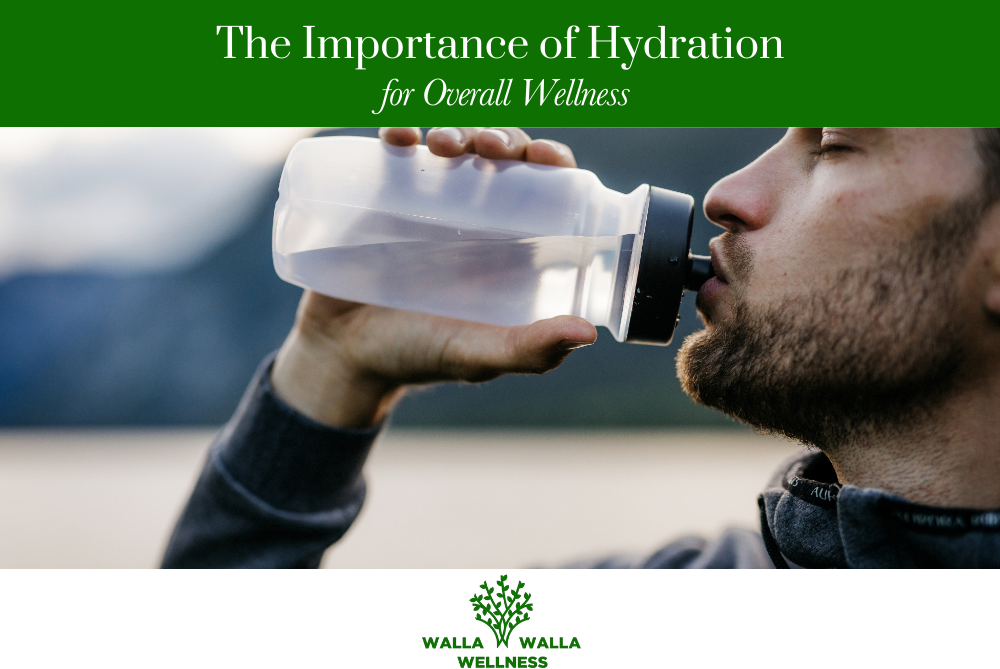 At Walla Walla Wellness, we believe that proper hydration is one of the fundamental pillars of good health. While drinking water may seem like a simple habit, many people do not consume enough fluids to support their body’s needs. Dehydration can lead to fatigue, headaches, poor digestion, and even long-term health complications. In this blog, we’ll explore why hydration is essential, how much water you really need, and practical tips to maintain optimal hydration levels throughout the day.
At Walla Walla Wellness, we believe that proper hydration is one of the fundamental pillars of good health. While drinking water may seem like a simple habit, many people do not consume enough fluids to support their body’s needs. Dehydration can lead to fatigue, headaches, poor digestion, and even long-term health complications. In this blog, we’ll explore why hydration is essential, how much water you really need, and practical tips to maintain optimal hydration levels throughout the day.
Why Hydration Matters
Water makes up about 60% of the human body, playing a crucial role in nearly every physiological function. Staying well-hydrated helps with:
- Regulating Body Temperature – Sweating and respiration require adequate water to keep the body cool.
- Boosting Energy Levels – Dehydration can cause fatigue and brain fog, reducing your ability to focus and function effectively.
- Improving Digestion – Water aids in breaking down food and preventing constipation.
- Supporting Joint and Muscle Function – Proper hydration helps lubricate joints and reduce muscle cramps.
- Flushing Out Toxins – The kidneys rely on water to filter waste and remove toxins from the body.
- Enhancing Skin Health – Hydrated skin appears more vibrant, youthful, and healthy.
How Much Water Do You Really Need?
A general guideline is the 8×8 rule – drinking eight 8-ounce glasses of water a day. However, hydration needs can vary based on factors such as age, weight, activity level, and climate.
Consider these hydration recommendations:
- Men: About 3.7 liters (125 ounces) per day
- Women: About 2.7 liters (91 ounces) per day
- Athletes or active individuals: May require more to compensate for sweat loss
- Pregnant and breastfeeding women: Need additional fluids to support their baby’s needs
Listening to your body’s thirst signals is crucial, but waiting until you feel thirsty isn’t always the best indicator—mild dehydration often sets in before you realize it.
Signs of Dehydration
It’s important to recognize the symptoms of dehydration before it affects your health. Some early warning signs include:
- Dry mouth and thirst
- Dark yellow urine
- Fatigue and dizziness
- Headaches
- Dry skin
- Muscle cramps
Severe dehydration can lead to confusion, rapid heartbeat, and even hospitalization if left untreated. If you notice persistent symptoms, it’s essential to rehydrate immediately and seek medical advice if necessary.
Tips to Stay Hydrated
If you struggle to drink enough water, try these simple strategies:
- Start Your Day with Water: Drink a glass of water first thing in the morning to kickstart hydration.
- Flavor Your Water: Add slices of lemon, cucumber, or berries to enhance taste without added sugars.
- Use a Reusable Water Bottle: Carrying a bottle with you makes it easier to sip throughout the day.
- Set Hydration Goals: Use apps or alarms as reminders to drink water regularly.
- Eat Water-Rich Foods: Fruits and vegetables such as watermelon, cucumbers, oranges, and celery contribute to daily fluid intake.
- Monitor Your Urine Color: Aim for a pale yellow color as an indicator of proper hydration.
- Drink Before You’re Thirsty: Thirst is a late indicator of dehydration—make hydration a consistent habit.
Comprehensive Q&A on Hydration
Q: Can I drink too much water?
A: Yes, excessive water intake can lead to hyponatremia (water intoxication), which dilutes sodium levels in the blood. This condition is rare but can be dangerous. Stick to recommended intake levels unless advised otherwise by a healthcare professional.
Q: Does coffee or tea count towards hydration?
A: Yes! While caffeine is a mild diuretic, moderate consumption of coffee or tea still contributes to your overall fluid intake.
Q: What are the best alternatives to plain water?
A: Infused water, herbal teas, coconut water, and electrolyte-rich beverages (in moderation) are excellent options. Avoid sugary drinks and sodas as they can lead to dehydration over time.
Q: How can I tell if I’m drinking enough water?
A: The easiest way is to monitor urine color—pale yellow indicates proper hydration, while dark yellow or amber suggests you need more fluids.
Q: Do I need more water when exercising?
A: Yes! Drink water before, during, and after workouts to replenish fluids lost through sweat. If exercising intensely, consider drinks with electrolytes to maintain proper mineral balance.
Q: Are sports drinks necessary for hydration?
A: For most people, plain water is sufficient. However, for intense, prolonged exercise (over an hour), a low-sugar electrolyte drink can help restore lost salts and minerals.
Q: How does hydration affect mental clarity and mood?
A: Dehydration can cause brain fog, difficulty concentrating, irritability, and mood swings. Staying hydrated improves focus, memory, and overall cognitive function.
Q: Does hydration help with weight management?
A: Yes! Drinking water before meals can reduce appetite and prevent overeating. Additionally, proper hydration supports metabolism and digestion.
Prioritize Your Health with Proper Hydration
Hydration plays a crucial role in your overall well-being, impacting everything from energy levels to digestion, joint health, and skin appearance. Making small, conscious efforts to drink enough water daily can significantly improve your quality of life.
At Walla Walla Wellness, we’re here to support your journey toward better health. If you have questions about hydration or any other wellness concerns, feel free to reach out to us.
Contact Us:
📍 Address: 694 W. Rose St., Walla Walla, WA 99362
📞 Phone: (509) 529-4676
Stay hydrated, stay healthy!
